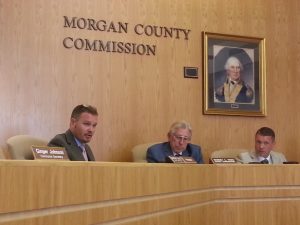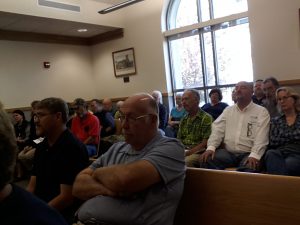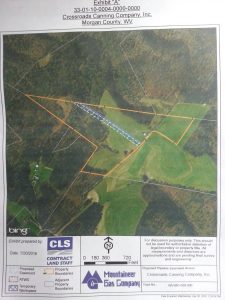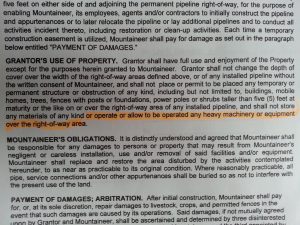At a meeting of the Morgan County Commission in Berkeley Springs this week,
Mountaineer Gas was accused of bullying and threatening farmers, landowners and citizens.

Brad Close
Bob Ford
Joel Tuttle
The Commission put the company’s proposed gas pipeline on the agenda at its meeting yesterday because the Commissioners had been getting calls from farmers and other landowners in the area about the gas company’s threats to use eminent domain to grab rights of way through the middle of prime farmland.
Brad Close read a statement from the company saying that they planned to take the “least intrusive” and “most reasonable” route though the county.
But Bob Ford said that he spoke with farmers who said that Mountaineer Gas was being inflexible about the routes through their farms and that they were threatened with the use of eminent domain.
“I have a real problem with the pipeline,” Ford said. “They want to go to take the shortest path through their property, which is prime farm country. Morgan County has very little farmland left. These are actual farmers. They farm their property for a living. They were told they were going to put the pipeline through there approximately three feet deep.”

“I’m really frustrated with Mountaineer Gas. They come stumbling into our county and approach landowners about buying land. When our property owners come to us, we don’t have answers. The company doesn’t come to us. I have to read about it in the newspapers.”
“The landowners say they are being bullied. I have no reason not to believe these people. If they are crop farming that farm, they are going to be plowing that farm within two feet. They tell them they can farm, but they turn around and put a statement in that you can’t run heavy equipment over it?”
“If they want me as a commissioner to support what they are doing, they need to come up with some answers. I need to answer to my constituents. And I can’t do that now. I do have enough common sense to know that if you are going to bury a pipe three foot deep from the top and I’m going to plow the soil and subsoil up to 24 inches and I’m going to be running combines across there, that is heavy equipment. They are going to take a 75 foot construction right of way right through the heart of these farms. They aren’t going through woodland. They are going right through the heart of these pasture fields. They said they can continue farming. But who is going to repair that farmland in that 75 foot right of way that these people are relying on? You are talking about a major piece of ground. They are putting some of our farmers at risk. I don’t see why they can’t bury a pipe six foot deep. This individual I talked to said if they buried the pipe four to six foot deep, he probably wouldn’t have a problem with it.”

Mountaineer Gas Map of Proposed Pipeline Cutting Through Prime Farmland
“Until Mountaineer Gas answers some of these questions, I’m going to be furious,” Ford said. “This isn’t the good old days when you just come in and run over people’s property and think you can get away with this without rights.”
“I’m being told that Mountaineer Gas is not too willing to compromise because the farmers are being told that if they don’t take the offer they will take it under eminent domain. I don’t like that.”
Close said that he informed Mountaineer Gas about the reported threats by the company of using eminent domain and told them if he hears that again, “there are going to be some severe issues.”
“It’s premature to be doing that kind of thing,” Close said.
“Mountaineer Gas wants to put a pipeline in,” Ford said. “I’m an infrastructure person. I believe we have to have infrastructure in the state. Natural gas is the way the country is going to evolve. We have an abundance of it. It’s proven it’s environmentally safe. We need it. But you just can’t go in and wrecking people’s livelihoods. These people depend on the land to farm. Why don’t they go through the woodlands? Why don’t they put it on the periphery of the field? Why do they have to go right straight through the heart of their farms?”

Mountaineer Gas Pipeline Agreement Prohibiting Use of “Heavy Equipment”
“I’m being told that Mountaineer Gas is telling farmers that if they don’t take the offer, they are going right straight to eminent domain,” Ford said. “That is a bully. It’s not proper.”
“There can’t be any bullying going on,” Close said.
Commissioner Joel Tuttle said — “I just assumed they wanted to play good cop bad cop and they sent in the bad cop first.”
“They don’t have permits,” Tuttle said. “I just can’t believe that the first thing they say is — we are going to offer you this. And the farmer says — I’m not so sure. And they say — you either say you either sign it or we are going to take it with eminent domain.”
Close said threatening eminent domain “is premature.”
“That is something we will address with our communication,” Close said. “The company is saying — the least intrusive possible, the most reasonable route. That leads me to believe there is room for negotiations.”
Tuttle said — “I saw one of the routes and it seemed pretty intrusive to me – smack down the middle of the field. That’s where I think we are headed with that.”
“The farmers are saying it’s the most intrusive, not the least,” Tuttle said. “There needs to be a compromise of some sort. I’m pro infrastructure. This is a way forward as well. There needs to be some sort of dialogue or compromise.”
Ford said that if a farmer or the farmer’s family wanted to eventually stop farming and sell the land for housing, the price of the property would go up significantly.
But Tuttle asked — “Who would want to build a house so close to a gas pipeline?”
“I know they say it’s safe,” Tuttle said. “But who wants to put a house within a couple of hundred feet of a pipeline? Under eminent domain, they are going to give the price as if it is farmland. Right now it is. But it has a higher potential for housing.”
“If you want to put a wrench into it, I suggest to all the farmers put in an application in for farmland protection,” Ford said. “Once they put a farmland easement in, they can’t do anything. They have to go around it.”
The Commissioners agreed to go to Charleston and meet with Mountaineer Gas and the state development office.
The Commissioners all have come out in favor of the pipeline.
In a May 26, 2016 letter to the West Virginia Public Service Commission, Close wrote “on behalf of the Morgan County Commission, I write to offer our full support of Mountaineer Gas Company’s plan to expand capacity of its existing natural gas distribution system in the Eastern Panhandle.”
And Ford, Close and Tuttle are still all in favor of it.
But the citizens attending the hearing were overwhelmingly not in favor.
When Ford said that most people in the county understand the need for the gas pipeline — many people in the room responded with a resounding — no.
The Close letter was one of seven sent to the Public Service Commission in favor of the pipeline. But 70 letters, most from Morgan County residents, were registered in opposition.
Toward the end of the meeting, some citizens who attended were allowed to speak.
Dave O’Brien, who has a cabin rental business at the eastern side of the county, said that Mountaineer Gas came by his property looking to cut through several acres.
“They took anything but the least invasive,” O’Brien said. “They said they were going to take a corner of our property. 20 to 25 acres. They are trying to increase their profits. Instead of digging through a hill, they want to come around the side of a hill, which is on our property. And that’s where they want to run the pipe. It’s a wonderful example of how they bully us. They say least invasive, but it’s most invasive — which is to take our land. I’m glad to hear that you don’t like the threats of eminent domain because eminent domain is the only way they will get any of our land.”
Patricia Kesecker said she is on one of three large farms being threatened by Mountaineer Gas — the Kesecker farm, the Stotler Farm and the Kerns farm.
“The pipeline route is totally invasive on our property,” Kesecker said. “We thought we were standing alone until we started talking about meetings. We didn’t know we could say no. But these people gave us the backbone to say no.”
“The gas company says we can continue farming, but then the contract says no — you can’t cross over with heavy equipment. It’s very intrusive. And they are bullying people — especially older people who don’t have the knowledge or they don’t have people to back them up or explain to them what is going on. They are threatening people with eminent domain. They should be brought up on that. We need the Mountaineer Gas people to come in to your Commission meeting. It’s just not right. These people are here to support everybody. And I am so happy that they will support landowners.”
Another farmer, Donald Stotler said “the first time they got in contact with us, they wanted to sit down and give us an estimate on what he would pay.”
“When we got done, he looked at me and said — well are you ready to sign? And I said no. I said I’m not ready to sign, this is a big decision. Mr. Ford said a 75 foot right of way. They actually want 100 foot right of way. And after that line is put in, if they want to come back in the following years, they can come in and put in other lines, put in a bigger line.”
“It’s not environmentally safe like they say it is,” Stotler said. “If you look and see what happened down in Sissonville, the line that blew up, it melted the blacktop. It’s wrong the way they pressure you. The first agent was here for probably a month. He would call two or three times a week wanting to know if I had come up with a price. I said when I do, I’ll call you.”
“They shipped that agent to Pennsylvania. I had another one two weeks ago. And he said — I’d like to stop by once a week and see what kind of progress we’re making. I said, whenever I get ready, I’ll call you. I have your number.”
Frank Rodgers of Cacapon Institute challenged Bob Ford’s claim that natural gas is “clean energy.”
“This is primarily fracked gas out of Pennsylvania,” Rodgers said. “At the end point, it is a clean burning fuel. But the extraction process of fracking is one of the most polluting most damaging kind of extreme extraction. Studies have shown that in counties with fracking, there is up to a ten times higher birth defect rate in the children. It decimates the water table. It destroys the ability to live in the county once the water tables have been destroyed. We have seen this in Bradford County where people can light their drinking water on fire. It is not a clean fuel. Fracked gas is one of the dirtiest fuels. That is one of the dirtiest kinds of extraction possible.”
“This pipeline would encourage dependence on fracked gas. We don’t have fracking in this county now. But the next play that the gas companies are looking at is the Utica and we are smack in the middle of that. When the Marcellus is played out and they decide to go a little deeper, they will start fracking in Morgan County and in the Cacapon Valley.”
Deidre Kuehn said she was speaking with a gentleman who lives in Berkeley County and who owns property in another part of West Virginia where they have a natural gas pipeline.
“He said not only is the water undrinkable, but the residents who live there full time have to live with the smell of natural gas,” Kuehn said. “And the people who have called to complain were told that it’s not at what they consider to be a dangerous level so they will be fine.”
